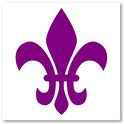You've probably read those articles that say that if you haven't got it by around age 7, you will never be able to talk with a perfect accent.
I know how you feel after you read something like that.
Terrific, you think.
I'll be XX (fill in the year yourself) this year, so what is the use of starting to learn French?
Well, how old are you going to be if you don't start? Hmmm?
Chin up. You can make progress at this if you work at it. Truly. And it is lots of fun when you get going.
If you have had even a little French in the past, you will be surprised at how much is still in there.
I took Spanish lessons before a trip to Buenos Aires, and I was amazed at how the words kept coming out in French -- words that I did not even realize I remembered from my two years of high school French.
Even if the only French words you know are Yves St, Laurent, you can learn.
And it will be good for you.
I have read that learning a new language at any age is supposed to be helpful in preventing Altzeimer's and dementia. It supposedly wears new grooves in parts of your brain.
So let's make our brains groovy.
Ok, you ask, how do I start?
Some people think that the only way to learn is to go to a month-long immersion class in France and soak it all in.
That would certainly be one way.
But that job thing or that family thing -- not to mention that money thing -- may make a long immersion in France impossible.
If you are someone for whom the word "summer" is a verb -- as in "I love to 'summer' at the Vineyard" -- I suggest that you try this immersion method.
If not, check and see if there is an Alliance France group near you (they list their locations on their internet site). They offer classes, and I understand they are very good. Alas, I have none near me.
See if a community college near you offers classes or if a French high school teacher in your town would give you some lessons. I really think it is a good idea to start with someone face-to-face who can get you on the right path with pronunciation and grammar.
If that is not possible, then just go at it yourself with all you've got.
There are lots of tools to learn French, and it can be a bit overwhelming to try to wade through them all.
Here are some things that I used that I thought were helpful when I started to learn French about two and a half years ago. I am going to start with two items today, but I will be adding more in later posts.
You need to start building your vocabulary, but you also need to understand the grammar structure as you learn. Here are two items to get you started. They won't break the bank, but they will get you a good foundation if you practice every day.
The book French: How to Speak and Write It by Joseph Lemaire has pictures with vocabulary and grammar lessons that are easy to follow. Many of the words are written out phonetically so you can see how to pronounce them. The book was first published in 1962, and it is still in print. It is pretty easy to find online if you cannot find it at a store near you.
Here is a link French: How to Speak and Write It (English and French Edition)
I really love this next item. It is a set of CDs called Drive and Learn French. The CDs tell the story of Jon and his French friend Jacqueline. Jon meets Jacqueline at the gym , falls head over heels for her, and he decides he needs to learn to speak French to impress her.
I especially liked this program because it has lots of catchy songs that help you remember the words. There is one song set at a restaurant that I found very handy when I visited France after working with this CD --
"We have a reservation -- Nous avons réservé"
This program teaches you greetings, numbers, colors, weather, directions, words to use on the telephone, how to order at a restaurant -- lots of useful things.
Here is a link Drive & Learn French 2 CD's & a Listener's Guide
As you can see there is a Listener's Guide so you can read and follow along with the action and music (though not while driving, please).
In future posts, I will be reviewing more items that I have been using to learn French. I will include items for beginners and also for intermediate learners.
Please let me know how you are progressing with this beautiful language.
Au revoir.










